Long-Term Constipation May Lead to Cancer, Massage These 4 Acupoints to Relieve It
Research has confirmed that chronic constipation is one of the risk factors for colorectal neoplasms. However, traditional Chinese medicine (TCM) techniques such as acupressure massage, herbal medicine, and daily diet can effectively treat constipation, thus reducing the risk of colorectal neoplasms. In the United States, constipation is one of the most common gastrointestinal conditions, with at least 2.5 million people seeking medical attention yearly. The prevalence of constipation in adults is about 16 percent, with 33 percent over 60 years old. Elderly people often experience difficulty in bowel movements due to dryness in the intestines. Young people and office workers may have poor bowel movements due to prolonged sitting and high stress levels. In addition, processed foods in the modern diet have led to an increasing number of people suffering from constipation. A study published in the journal Alimentary Pharmacology and Therapeutics in 2014 showed that the incidence and prevalence of colorectal cancer in patients with chronic constipation were significantly higher than those in the control group without chronic constipation, and these risks increased with the condition’s severity. So how can we address constipation and reduce or avoid the risk of colon cancer? Let us explore what the ancient wisdom of TCM can teach us about constipation. 5 Types of Constipation First, we must understand the various types of constipation. 1. Slow Bowel Movements This type of constipation is characterized by very slow gastrointestinal peristalsis and poor bowel movement, which results from poor bowel habits. According to TCM, the early morning hours from 5:00 to 7:00 a.m. are the times the large intestine meridian circulates, and it is best to have a bowel movement during this time. However, you may struggle to have a bowel movement in the morning. As a result, intestinal movement deteriorates, leading to delayed transit constipation. TCM posits that the human body has a meridian system that serves as the pathway for energy circulation, responsible for delivering qi (vital energy) and blood throughout the body. There are 12 meridians in the human body, each connected to one of the 12 internal organs. The 24 hours are divided into 12 two-hour periods, during which the corresponding meridians and their associated organs are particularly active. Acupoints—specific points with special functions on the meridians—can be stimulated through acupuncture or acupressure to treat diseases related to corresponding organs. 2. Stress-Induced Psychological, stress-induced constipation is the most common type, especially among office workers who cannot have a bowel movement in the early morning hours. Many young people nowadays habitually stay up late and may skip breakfast or not have enough time for a bowel movement. Under the double pressures of time and mood, nervous stress constipation is easily triggered. 3. Rectal or Colorectal Tumors or Diseases This type of constipation is caused by tumors or other diseases in the rectum or colon. Conversely, constipation can also contribute to developing tumors in the rectum or colon. 4. Pregnancy Some women experience constipation during pregnancy. 5. Medication-Induced This type of constipation is caused by medications treating other conditions. Massage These 4 Acupoints to Promote Bowel Movement 1. Kongzui (LU 6): Treats Constipation and Hemorrhoids We can use acupressure to help promote bowel movement. I recommend an important acupoint called Kongzui. In ancient times, Kongzui was commonly used to treat hemorrhoids caused by poor bowel movement or constipation, and it had excellent results. The Kongzui is located halfway between the wrist and elbow crease, along the palmar aspect of the forearm, beginning from the base of the thumb to the wrist. Pressing and massaging this point can stimulate the rectum and initiate bowel movement when experiencing hard stools or poor bowel movement. The Kongzui acupoint (LU 6). (The Epoch Times) 2. Chengshan (BL 57): Treats Constipation, Hemorrhoids, and Lower Back Pain The acupoint Chengshan is located in the middle of the lower leg, between the knee crease and the heel, where there is a depression formed by the gastrocnemius muscle. Like acupoint Kongzui, Chengshan is highly effective in treating hemorrhoids and constipation. Proper acupressure on this point can almost cure constipation. Chengshan is also beneficial for alleviating lower back pain. Therefore, people with lower back pain, constipation, or hemorrhoids can massage this acupoint for relief. The Chengshan acupoint (BL 57). (The Epoch Times) 3. Shenmen (HT 7): Treats Stress-Induced Constipation and Promotes Sleep The acupoint Shenmen, which can alleviate stress and pressure, is located at the junction between the little and ring fingers toward the wrist. Drawing a line from that point to where it intersects with the wrist identifies the location of Shenme
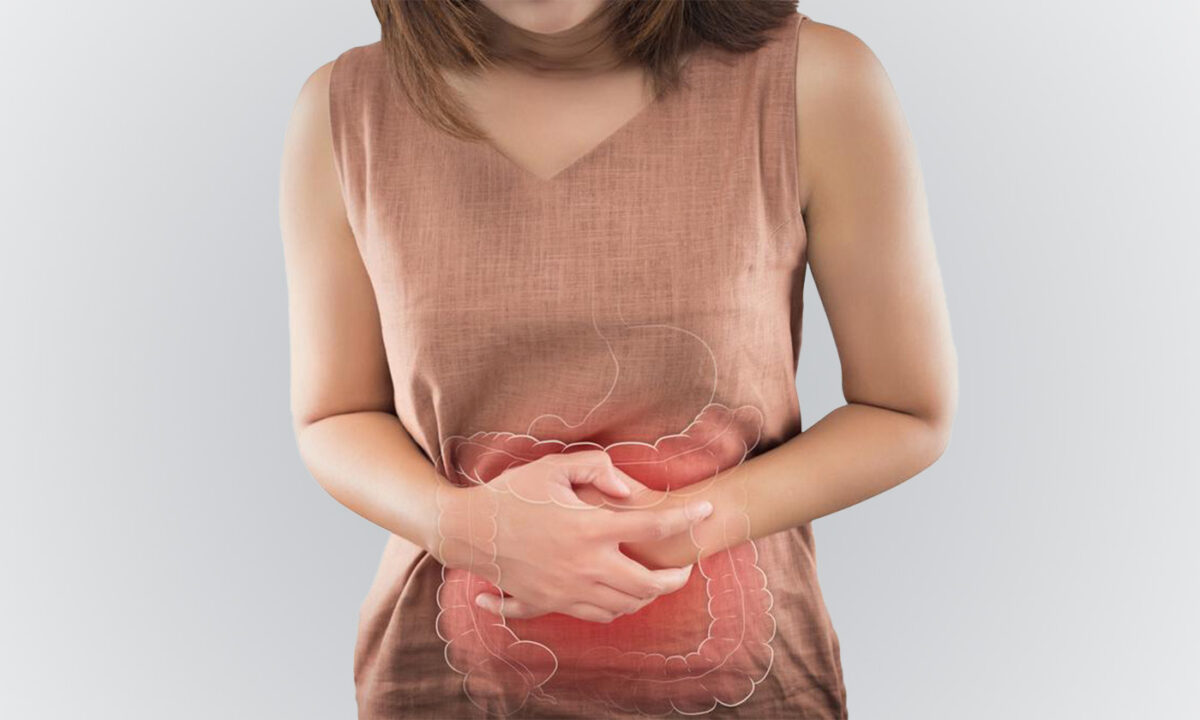
Research has confirmed that chronic constipation is one of the risk factors for colorectal neoplasms. However, traditional Chinese medicine (TCM) techniques such as acupressure massage, herbal medicine, and daily diet can effectively treat constipation, thus reducing the risk of colorectal neoplasms.
In the United States, constipation is one of the most common gastrointestinal conditions, with at least 2.5 million people seeking medical attention yearly.
The prevalence of constipation in adults is about 16 percent, with 33 percent over 60 years old. Elderly people often experience difficulty in bowel movements due to dryness in the intestines. Young people and office workers may have poor bowel movements due to prolonged sitting and high stress levels.
In addition, processed foods in the modern diet have led to an increasing number of people suffering from constipation.
A study published in the journal Alimentary Pharmacology and Therapeutics in 2014 showed that the incidence and prevalence of colorectal cancer in patients with chronic constipation were significantly higher than those in the control group without chronic constipation, and these risks increased with the condition’s severity.
So how can we address constipation and reduce or avoid the risk of colon cancer? Let us explore what the ancient wisdom of TCM can teach us about constipation.
5 Types of Constipation
First, we must understand the various types of constipation.
1. Slow Bowel Movements
This type of constipation is characterized by very slow gastrointestinal peristalsis and poor bowel movement, which results from poor bowel habits.
According to TCM, the early morning hours from 5:00 to 7:00 a.m. are the times the large intestine meridian circulates, and it is best to have a bowel movement during this time. However, you may struggle to have a bowel movement in the morning. As a result, intestinal movement deteriorates, leading to delayed transit constipation.
TCM posits that the human body has a meridian system that serves as the pathway for energy circulation, responsible for delivering qi (vital energy) and blood throughout the body. There are 12 meridians in the human body, each connected to one of the 12 internal organs.
The 24 hours are divided into 12 two-hour periods, during which the corresponding meridians and their associated organs are particularly active. Acupoints—specific points with special functions on the meridians—can be stimulated through acupuncture or acupressure to treat diseases related to corresponding organs.
2. Stress-Induced
Psychological, stress-induced constipation is the most common type, especially among office workers who cannot have a bowel movement in the early morning hours. Many young people nowadays habitually stay up late and may skip breakfast or not have enough time for a bowel movement. Under the double pressures of time and mood, nervous stress constipation is easily triggered.
3. Rectal or Colorectal Tumors or Diseases
This type of constipation is caused by tumors or other diseases in the rectum or colon. Conversely, constipation can also contribute to developing tumors in the rectum or colon.
4. Pregnancy
Some women experience constipation during pregnancy.
5. Medication-Induced
This type of constipation is caused by medications treating other conditions.
Massage These 4 Acupoints to Promote Bowel Movement
1. Kongzui (LU 6): Treats Constipation and Hemorrhoids
We can use acupressure to help promote bowel movement. I recommend an important acupoint called Kongzui. In ancient times, Kongzui was commonly used to treat hemorrhoids caused by poor bowel movement or constipation, and it had excellent results.
The Kongzui is located halfway between the wrist and elbow crease, along the palmar aspect of the forearm, beginning from the base of the thumb to the wrist.
Pressing and massaging this point can stimulate the rectum and initiate bowel movement when experiencing hard stools or poor bowel movement.
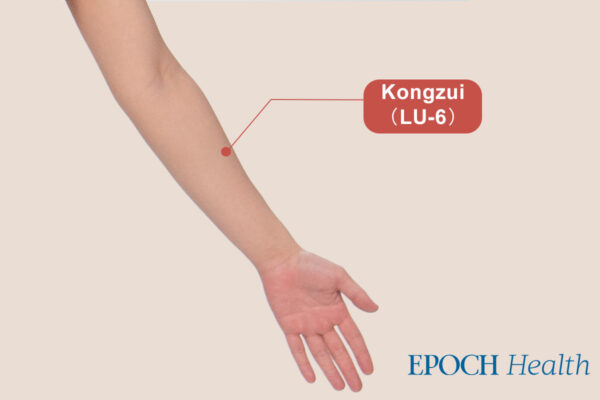
2. Chengshan (BL 57): Treats Constipation, Hemorrhoids, and Lower Back Pain
The acupoint Chengshan is located in the middle of the lower leg, between the knee crease and the heel, where there is a depression formed by the gastrocnemius muscle. Like acupoint Kongzui, Chengshan is highly effective in treating hemorrhoids and constipation. Proper acupressure on this point can almost cure constipation.
Chengshan is also beneficial for alleviating lower back pain. Therefore, people with lower back pain, constipation, or hemorrhoids can massage this acupoint for relief.
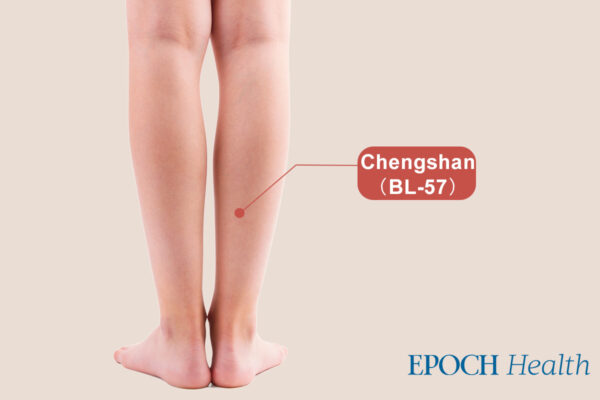
3. Shenmen (HT 7): Treats Stress-Induced Constipation and Promotes Sleep
The acupoint Shenmen, which can alleviate stress and pressure, is located at the junction between the little and ring fingers toward the wrist. Drawing a line from that point to where it intersects with the wrist identifies the location of Shenmen. Massaging this acupoint can immediately reduce stress and improve sleep quality.
Therefore, combining Shenmen with acupoint Three Yin Intersection (SP 6) is often used to treat patients with mental or sleep disorders. Shenmen helps to reduce stress, so if your constipation is caused by stress, massaging this acupoint can provide relief.
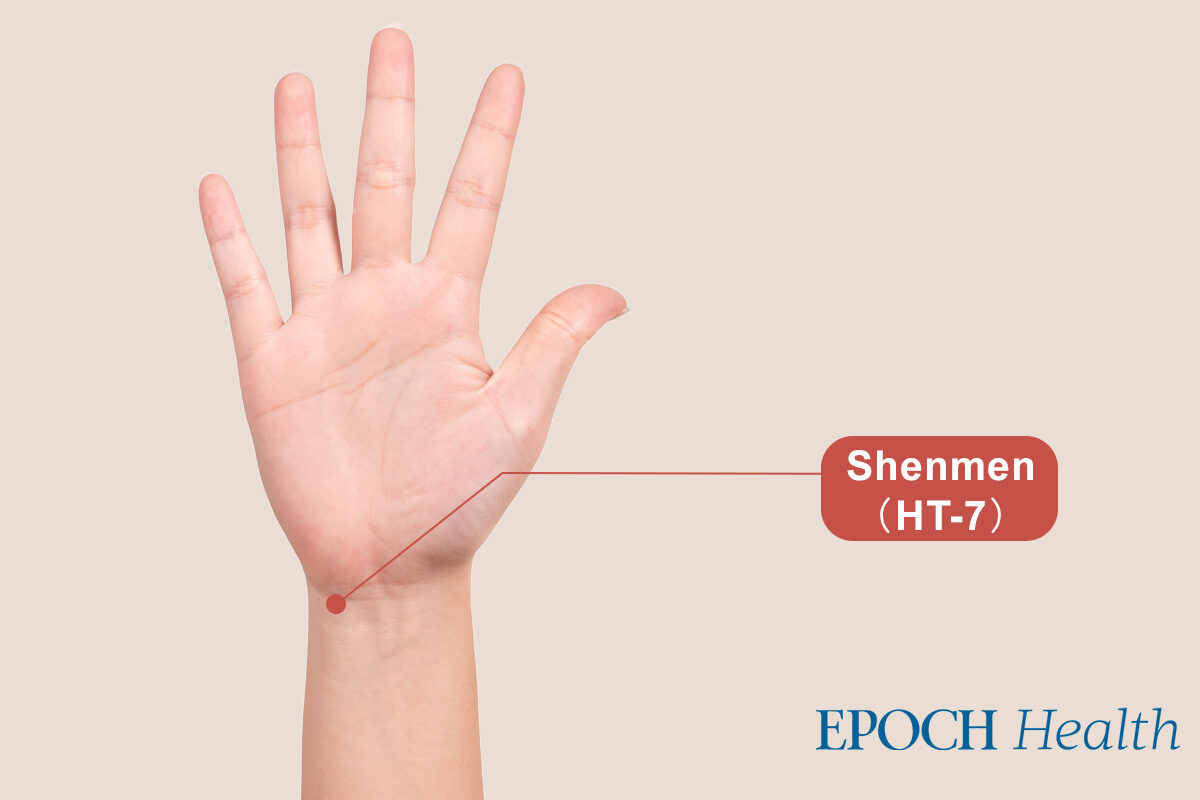
4. Tianshu (ST 25): Treats Constipation and Diarrhea
The acupoint Tianshu has a positive effect on treating both constipation and diarrhea. It is located about three finger widths outward on either side of the navel.
Press gently and release the acupoint with the thumb, repeating this motion seven to nine times.
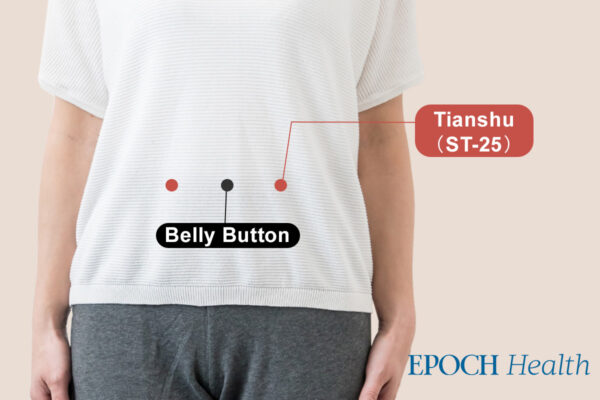
TCM Remedies for Treating Constipation
Many traditional herbal formulas have proven to be effective in treating various conditions. Although their usage may vary depending on the individual’s condition, they can still provide good results when tailored accordingly.
1. Five-Seeds Pill: Lubricates the Intestines and Promotes Peristalsis
The Five-Seeds Pill consists of five types of seeds: pine nut, arborvitae seed, Japanese bush cherry seed, peach kernel, and apricot seed, combined with tangerine peel.
These seeds, rich in oil content, naturally lubricate and smooth the intestines. This prescription is specifically for patients with deficiency-type constipation, characterized by slow gastrointestinal motility.
2. Cistanches Herba and Tuber Fleeceflower: Moistens the Intestines and Enhances the Kidneys for Older People
Some older individuals may experience poor bowel movements due to dryness in the intestines. As people age, their intestines tend to become drier. In such cases, it is recommended to use a combination of moistening formulas and kidney-tonifying herbs. For example, Cistanches Herba and Tuber Fleeceflower moisten the intestines and tonify the kidneys. These two herbs can help promote smooth bowel movements while nourishing the kidneys.
3. Chinese Angelica Root: Enriches Blood, Lubricates the Intestines, and Promotes Fertility
I had a patient who could not conceive even after seven to eight years of marriage and who also suffered from constipation. I recommended she take 100 grams of Chinese angelica root daily. Chinese angelica root not only nourishes the blood but also lubricates the intestines. After a few months of consumption, she experienced smooth bowel movements and successfully conceived and gave birth to two children.
4. Dietary Considerations
Constipated people should consume certain fruits that aid in bowel movements, such as papaya, bananas, and pineapple. These fruits are easily accessible and can significantly improve bowel regularity.
Papaya is rich in fiber and enzymes that can break down proteins, stimulate gastrointestinal motility, and facilitate smooth bowel movements. Consuming half a papaya per day effectively alleviates constipation.
Papaya also contains a substantial amount of lutein, which aids in the sensitivity of photoreceptor cells in the retina. Due to the high lutein content, consuming half to one whole papaya at once might temporarily turn your palms, eyes, and face slightly yellow. However, there is no need to worry; the coloration is harmless and will naturally disappear shortly after you’ve eaten the papaya.
Pineapple is rich in dietary fiber and contains enzymes similar to those found in papaya, contributing to the breakdown of proteins. Therefore, it is considered by modern medicine to eliminate free radicals in the body and promote digestion. Pineapple also contains citric acid, making it a good source of vitamin C.
*Some herbs mentioned in this article may be unfamiliar, but they are generally available in Asian supermarkets.
Note: Because different people have different constitutions, it is recommended to consult your doctor or TCM experts.












